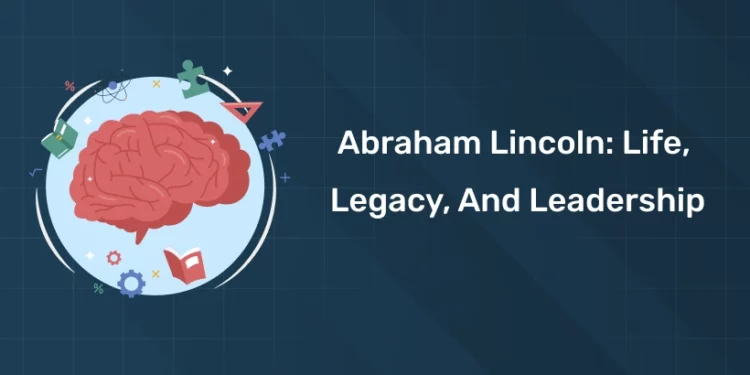Table of Contents
Abraham Lincoln was the 16th president of the United States and is considered as one of America’s greatest heroes due to his role in the liberation of enslaved people. Almost all historians judge Lincoln as the greatest President in American history because of the way he exercised leadership during the war and because of the impact of that leadership on the moral and political character of the nation. His Gettysburg Address stands as one of the most famous pieces of oratory in American history.
Lincoln was assassinated at a time when his country needed him to complete the great task of reunifying the nation. His support of democracy embodies the ideals of self-government that all nations strive to achieve. Lincoln’s humane personality and incredible impact on the nation have endowed him with an enduring legacy.
Life of Abraham Lincoln
Abraham Lincoln was born February 12, 1809 in a one room backwoods cabin in Hardin County, Kentucky. He was taken to a farm in the neighboring valley of Knob Creek when he was two years old. His father, Thomas Lincoln, was the descendant of a weaver’s apprentice who had migrated from England to Massachusetts in 1637. He was a stern man whom young Abe never liked very much. Lincoln’s mother, Nancy Hanks, died of tremetol when he was only nine years old.
He was deeply affected by her death and put more tension on his already strained relationship with his father. Lincoln once said that he owed everything to her guidance. Thomas and Nancy Lincoln had three children: Sarah, Abraham, and Thomas, who died in infancy. Both his parents were almost completely illiterate, and he himself received little formal education. In December 1816 the family moved to Perry County in southern Indiana. Shortly after Nancy’s death, Thomas Lincoln married Sarah Bush Johnston.
She was a bright woman who encouraged Abe’s education and young Abe immediately bonded with his stepmother. He once said that, as a boy, he had gone to school “by littles” and his entire schooling amounted to no more than one year’s attendance. All the training he got was from travelling teachers.
Abraham Lincoln’s Childhood
Abraham Lincoln’s childhood was filled with poverty, farm chores and reading by the light of the fireplace. He had to work hard right from an early age. Young Abe was always attracted to books and although there was a shortage of book supply in Indiana at those times, Abraham used to walk to miles to borrow a book.
In March 1830, the family migrated to Macon County, Illinois. At the age of seventeen he found work on a ferry boat. Two years later he built a flatboat, carried load in it and sold it to get his first earnings. Lincoln eventually migrated to the small community of New Salem, Illinois, where he worked as a shopkeeper, postmaster and general store owner.
It was during his time in New Salem that he acquired social skills and storytelling talent that made him popular with the locals.
Abraham Lincoln’s Entry into Politics
In 1834, at the age of 25, Lincoln began his political career and was elected to the Illinois state legislature as a member of the Whig Party. Once there, he taught himself law by reading William Blackstone’s Commentaries on the Laws of England. He was then admitted to the bar in 1837 and moved to Springfield, Illinois, to practice in the John T. Stuart law firm.
Lincoln served a single term in the U.S. House of Representatives from 1847 to 1849. He was the only member from Whig. Lincoln used his term in office to condemn the Mexican-American War and supported Zachary Taylor for president in 1848. This made him unpopular and he decided not to run for second term, but instead returned to Springfield to practice law.
Abraham Lincoln’s Political Career
In 1854, Congress passed the Kansas-Nebraska Act, which repealed the Missouri Compromise, allowing states and territories to decide for themselves whether to allow slavery. The law provoked violent opposition in Kansas and Illinois, and it gave rise to the Republican Party. In his race to the Senate, Lincoln decided to challenge sitting U.S. Senator Stephen Douglas. In his nomination acceptance speech, he criticized Douglas for promoting slavery and declared “a house divided cannot stand.” During his campaign, Lincoln participated in seven debates held in different cities across Illinois.
On May 1860, Lincoln submitted his nomination as the presidential candidate. People supported Lincoln’s nomination because of his views on slavery, his support for improving the national infrastructure, and the protective tariff. Lincoln received 180 of 303 Electoral College votes and won the U.S. presidency defeating Douglas . Lincoln’s cabinet was a strong one composed of many of his political rivals, including William Seward, Salmon P. Chase, Edward Bates and Edwin Stanton.
America’s costliest and bloodiest war, the Civil War, started on April 12, 1861. During the war, Lincoln had to face defiance from his generals, his Cabinet, his party and a majority of the American people. Even though Lincoln had a brief experience, he surprised many when he proved to be a capable wartime leader, learning quickly about strategy and tactics in the early years of the Civil War, and about choosing the ablest commanders.
On January 1, 1863, Lincoln delivered the Emancipation Proclamation, reshaping the cause of the Civil War from saving the Union to abolishing slavery. It stated that all individuals who were held as enslaved people in rebellious states “henceforward shall be free.”. The Emancipation Proclamation was an effort in bringing an end to the war and on April 9, 1865, the Civil War was over. The war lasted for more than four years which left 600,000 Americans dead. Reconstruction process gained control and Lincoln favored a policy of quick reunification with a minimum of retribution.
Abraham Lincoln’s Family
Lincoln was married to Mary Todd on November 4, 1842. Todd was a high-spirited, well-educated woman from a distinguished Kentucky family. The couple had four sons – Robert Todd, Edward Baker, William Wallace and Thomas – of whom only Robert Todd survived to adulthood. During the Civil War, Lincoln suffered the death of his beloved son and had to take care of his wife who was under depression.
Abraham Lincoln’s Assassination
Abraham Lincoln was assassinated on April 14, 1865, by a Confederate sympathizer John Wilkes Booth at Ford’s Theatre in Washington, D.C. He was in a coma for nine hours and died the next morning. He was laid to rest in Springfield, Illinois.
Almost all historians judge Lincoln as the greatest President in American history because of the way he exercised leadership during the war and because of the impact of that leadership on the moral and political character of the nation. His Gettysburg Address stands as one of the most famous pieces of oratory in American history.
Interesting Facts About Abraham Lincoln
1: Who was the first woman President of India?
- Even though Lincoln was a successful lawyer, he was largely self-educated.
- Lincoln is enshrined in the Wrestling Hall of Fame – He was a wrestling enthusiast and was defeated only once in approximately 300 matches.
- Lincoln created the Secret Service just hours before he was assassinated – He signed the legislation creating the U.S. Secret Service on April 14, 1865 and later in the evening he was assassinated at Ford’s Theatre.
- During his assassination, Lincoln’s bodyguard was absent. He had gone to watch the play at Washington DC’s Ford’s Theatre.
- Lincoln is the only president who has obtained a patent.
- Lincoln’s mother Nancy Lincoln died of a mysterious “milk sickness” that swept across southern Indiana.
- Grave robbers attempted to steal Lincoln’s corpse – In 1876 a gang of robbers from Chicago tried to steal Lincoln’s body from his tomb in Oak Ridge Cemetery in Springfield, Illinois.
- Lincoln is still ranked as one of the top three Presidents of the United States
Free UPSKILLING Courses!
Take your first step toward mastering in-demand skills, acing interviews, and securing top-tier jobs with Entri's free upskilling courses.
Start Learning!Abraham Lincoln 2026 Quiz
When was Abraham Lincoln born?
a) June 3, 1808
b) February 12, 1809
c) September 13, 1805
d) March 1, 1806
In which state was Abraham Lincoln born?
a) Kentucky
b) Chicago
c) California
d) Florida
When was Lincoln first elected to public office?
a) 1832
b) 1830
c) 1834
d) 1842
Which political party did Abraham Lincoln join?
a) Democrat
b) Republic
c) Whig
d) He was an independent
Who was Lincoln’s vice president during his first term?
a) Hannibal Hamlin
b) Edwin Stanton
c) Andrew Johnson
d) John C. Breckinridge
How did Abraham Lincoln die?
a) Cardiac arrest
b) Cancer
c) Age related illness
d) Was shot dead
Who was Lincoln’s political idol?
a) Henry Clay
b) Alexander Hamilton
c) John Calhoun
d) Winston Churchill
Abraham Lincoln helped end __________________ in America.
a) War
b) Immigration
c) Slavery
d) Discrimination
Abraham Lincoln was known for his __________________.
a) honesty
b) intelligence
c) simplicity
d) arrogance
How many debates did Lincoln have with Stephen Douglas?
a) 2
b) 4
c) 7
d) 9













